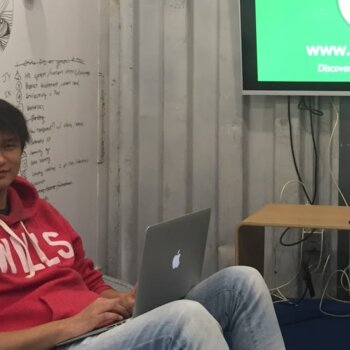The Southeast Asian startup scene is strong and getting stronger. Across the region, companies are emerging in fintech, edtech, insurtech, blockchain and many other areas. In 2017, Southeast Asian startups received $7.86 billion in investor funding, which is triple the investments seen the year before, according to Tech in Asia. The region also boasts four unicorns, including Grab and Go-Jek, reports CB Insights.
Yet Southeast Asia’s startups are hindered by skills gaps, particularly when it comes to hard tech skills and business leadership. Research from Google and Temasek predicted that Southeast Asia’s internet economy could grow to $200 billion, but it will need more homegrown talent to get there. The report noted that the region’s biggest players often seek developers and other hires in places such as China and India due to skills gaps in smaller markets. Increased tech and leadership ability are essential to Southeast Asian markets achieving their full potential.
The Leadership Gap
Efraim Pettersson Ivener, founding partner at the Bangkok-based TechGrind, says a dearth of leadership skills is the top problem is preventing companies in the region from becoming more successful. However, he also says that closing those gaps is difficult if other elements, such as basic tech skills, professionalism and adherence to contracts are missing. Ivener says his company, which operates accelerator and incubator programs and invests in regional startups, repeatedly sees these problems among business-side hires. He attributes these issues to the lightning-speed growth that is transforming countries that are, in many ways, still developing nations.
“Because SEA is so rapidly evolving from a third-world economy and society into the second-world economy (manufacturing), and now with tech attempting to build companies in the first-world economy, society can’t evolve as quickly as their economies have,” Ivener says via email. “The skills, concepts, and abilities needed to work in each next economic phase requires generations of learning, and this has all happened in SEA in one generation, effectively. So it will take time for universities, primary schools, and society as a whole to understand these concepts of being part of the global economy.”
But startups vying for funding today can’t wait generations to catch up. Kineret Karin, cofounder of the social good accelerator ImpacTech, says thriving startup ecosystems are now essential to national economies. For Southeast Asian startups to launch genuinely innovative products, as opposed to iterating on existing models, they’ll need leaders who are skilled and confident enough to break new ground. Her organization mentors startups on developing soft skills such as negotiation and creativity for this reason and coaches them to think beyond national borders toward creating globally-minded platforms.
Karin says strong leaders who are willing to buck conservative, risk-averse cultures will be key to attracting more investments. “Without taking more risks, creating breakthrough solutions, it is challenging for the startups to be attractive to big international investors or MNCs (multinational corporations) that are looking for acquisitions or partnerships,” she says. “Leadership skills are a must for taking a company to the next steps.”
First Education, Then Innovation
Both Ivener and Karin say education and cultural norms must shift if Southeast Asia is to produce the level of tech talent needed to push the region’s economies forward. That’s why their organizations emphasize soft skills and mentorship. Ivener says TechGrind makes a point of investing in startups that have gone through its programs because they’re able to train entrepreneurs and their teams on the vital skills they need for their businesses to succeed. “We help them create a viable tech startup that is not only capable of succeeding regionally and globally but that is also investable,” he says.
CoderSchool, a Ho Chi Minh City organization that offers training in design, programming and data science, sees education as the way forward as well. “There’s definitely a shortage of leadership-level talent,” says CoderSchool’s Director of Operations Edgar Camago. “Even just a cursory overview of the tech scene [in Vietnam] will show you that startups and companies across the board are struggling in their search for CTOs, architects, and project managers. Ask around and you’ll hear that a big part of the problem is cultural. The education system here doesn’t give students the tools and mindset to participate as leaders in multinational companies and foreign startups.”
But CoderSchool provides an antidote to the problem by giving ongoing support while students are enrolled in courses and even after they’ve completed them. The organization’s rigorous coursework includes lectures, hands-on development and a range of other approaches to ensure that students are fully immersed in their subject areas. Camago says the market’s demands are evolving, and to help Vietnamese tech professionals become more competitive, CoderSchool recently launched programs in hyperledger blockchain and machine learning.
“Our vision is that great people are everywhere,” Camago says. “But as we’ve grown, we’ve seen that ecosystem can matter a lot.” He is optimistic about Vietnam’s ecosystem, describing it as “vibrant and poised for breakout growth.” But like its neighboring countries, it will need the right mix of skills development and mentorship to reach the next level.
There’s a lot at stake. As Ivener notes, the most successful companies produce sustainable results, create jobs and are data-driven. And those types of businesses are built by leaders who possess attributes such as professionalism and a deep sense of how to motivate and guide their teams. Accelerators, incubators and tech education programs can provide the resources, but entrepreneurs must be willing to accept there are things they don’t know and skills they have not yet mastered. That’s critical because in Ivener’s view, “I believe this will make or break the entire tech industry in Southeast Asia.”
About the Author
This article was written by Casey Hynes is a freelance journalist and content marketing writer with extensive experience covering tech, entrepreneurship, and human rights in Asia.





























